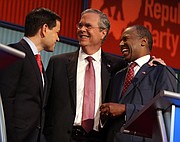Read more
* Trump jolts first GOP debate, rivals scramble for attention* Key takeaways from the first GOP debate of 2016 campaign * The 2016 GOP debate timeline * Fact check: A look at Republican candidates' statements in debate * Key takeaways from the GOP's second-stage debate
If the first in a series of Republican presidential debates proved anything Thursday night, it was that businessman and blowhard Donald Trump does not belong in the field.
Though he continued to throw out red-meat lines that have in fact tapped into a frustration of the American people with the last six-plus years of the Obama administration, his vague answers to important questions, his bluster about the media and other candidates, and his general lack of seriousness at the proceedings should cause the GOP electorate to dismiss him.
And Trump's admission at the outset of the debate that he wouldn't pledge to support the eventual nominee, and wouldn't rule out an independent candidacy, only further poisons the waters.
Unfortunately, the Fox News debate hosts couldn't dismiss him because he is currently leading most Republican polls, and he indeed did wind up with the largest amount of face time in the broadcast.
Trump's remarks that the GOP field wouldn't be talking about immigration if it weren't for him, that his comments about most Mexicans being murderers and rapists weren't covered "the way I said it" and that reporters are "a dishonest lot" speak to his unwillingness to engage in serious debate.
But when he throws out bon mots about the country's problem with political correctness and its status of "losing" current wars with China and Mexico, people know exactly what he means.
Several of the candidates - the top 10, based on several recent polls, were invited - acknowledged the billionaire businessman's outspokenness.
"He's hitting a nerve," said Ohio Gov. John Kasich. People who "tune him out" are "making a mistake."
Trump aside, what anyone who tuned in saw were Republican candidates fielding one after another of squirm-inducing questions. The trio of moderators, from the network accused by the political left of a bias toward the right, weren't tossing softballs.
Their ability to answer such questions should have given voters - and can in the future - a sense of wherewithal about the candidates, many of whom they may not be familiar with.
Again, Trump aside, most acquitted themselves well, some better than others. This is a field, after all, that can boast a variety of accomplishments, from turning around the fiscal fortunes of states (Kasich, Wisconsin Gov. Scott Walker and New Jersey Gov. Chris Christie) to rising from hard-scrabble starts (Florida Sen. Marco Rubio and Texas Sen. Ted Cruz) to brain surgery (Dr. Ben Carson).
The Democratic field, in comparison, is less accomplished, older and identifies less with the story of the average American.
The assumed pre-Trump front-runner, former Florida Gov. Jeb Bush, continued only to meet expectations. He may have soothed voters angry about his support of unpopular Common Core academic standards by stressing the need for only "higher standards," but some of the same voters may not be happy with his curious statement that "the great majority [of illegal immigrants] had no other option" than to come to the United States.
Similarly, Walker probably didn't help or hurt himself too much, handling several difficult questions about his pro-life stance, his immigration reversal and his jobs record but not breaking through the field with any of his answers. His description of himself as "aggressively normal" also may have characterized his debate performance.
Meanwhile, Rubio and Kasich probably exceeded expectations. The former clicked with lines about the presidential run not being a "resume competition," about Hillary Clinton being unable to match him "living paycheck to paycheck" and about the Constitution guaranteeing that "all human life is worthy of protection." Kasich, reveling in the fact the debate was in his state, ticked off his conservative bona fides but also spoke of the mentally ill, the addicted and the "people in the shadows."
Christie, a former prosecutor, may have scored several points in a testy exchange with Kentucky Sen. Rand Paul, who acted like a petulant child at being called out, while the soft-spoken Carson started slowly but finished strong in suggesting the country needs to move beyond politicians who would drive wedges between Americans.
Cruz, asked how he could win if he was his usual combative self, said if the public was looking for someone to "agree with the career politicians, I ain't your guy." And former Arkansas Gov. Mike Huckebee, as usual, got off a few humorous lines, suggesting President Obama's Iran deal strategy was "trust but vilify [his opponents]" and saying the election was about a person "who's very high in the polls but doesn't know how to govern [like Trump], a person who has been filled with scandals and who could not lead [like Trump], and of course I'm talking about Hillary Clinton."
Thursday's debate should, but may not have, ended the Trump boomlet, but it did display the depth and breadth of the Republican field for all the country to see and whetted appetites for the next one hosted by CNN in September.
